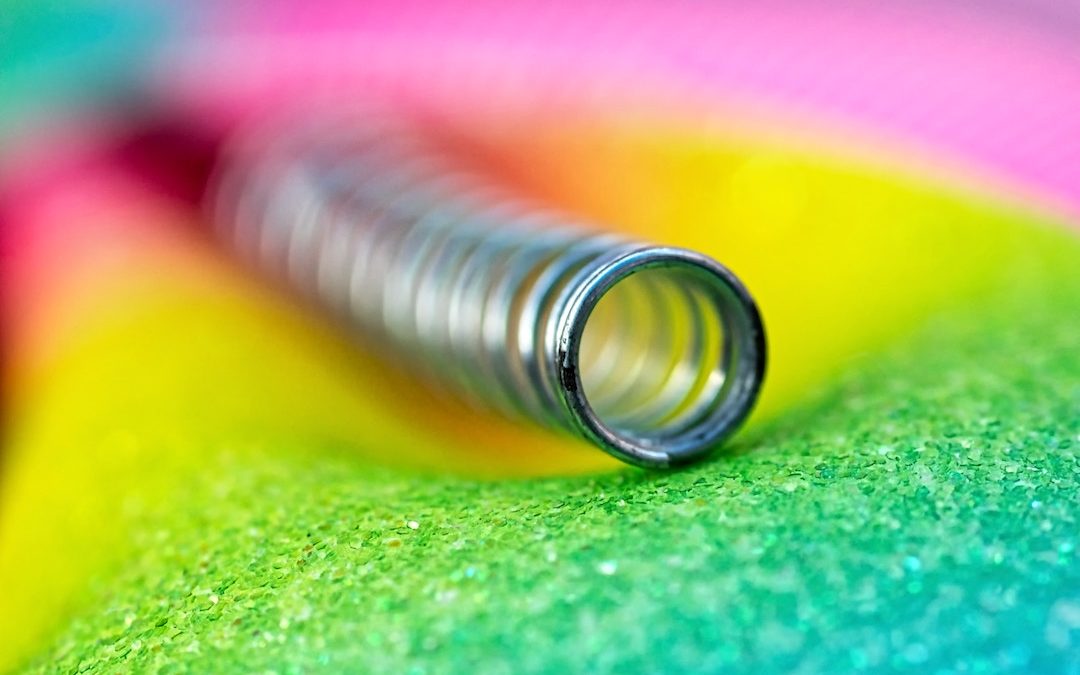
by Rachel Toalson | Wing Chair Musings
They were rowdy, loud, and I hadn’t quite gotten enough sleep last night. The noises were grating on me: some kids shrieking (at least it was in happiness, or something close to it), another kid tapping the table with a spoon (a soundtrack rhythm of annoying proportions), and one more kid racing a scooter through the kitchen (adding to the shrieks), while I tried to put together a smoothie for breakfast.
I poured the yogurt, shook out strawberries, added a few frozen bananas and switched on the blender, enjoying the familiar hum that almost drowned out the sounds of my children. I closed my eyes, trying not to count how many summer days remained, trying to breathe and grasp at a flimsy, slippery hope, trying not to admit that this—this intolerable, madness-filled morning—was the last straw of summer vacation.
I shut off the blender. Turned toward the glasses, lined up. Started to pour.
Someone screeched.
“This is the last straw.”
Had I said the words aloud?
I looked up. My oldest son was staring at me, his brown eyes wide. He repeated himself. “This is the last straw.” He held out a mason jar, one stainless steel straw scraping along its lip.
“Where are the other straws?” he said.
I couldn’t answer. I could only laugh.
He stared at me for a minute, then bent and opened the dishwasher, where other straws gathered in one rectangular tray. He stuck them in the cups after I filled them.
I thanked him for his help—a bright spot in an otherwise trying span of moments.
(Photo by Philip Veater on Unsplash)
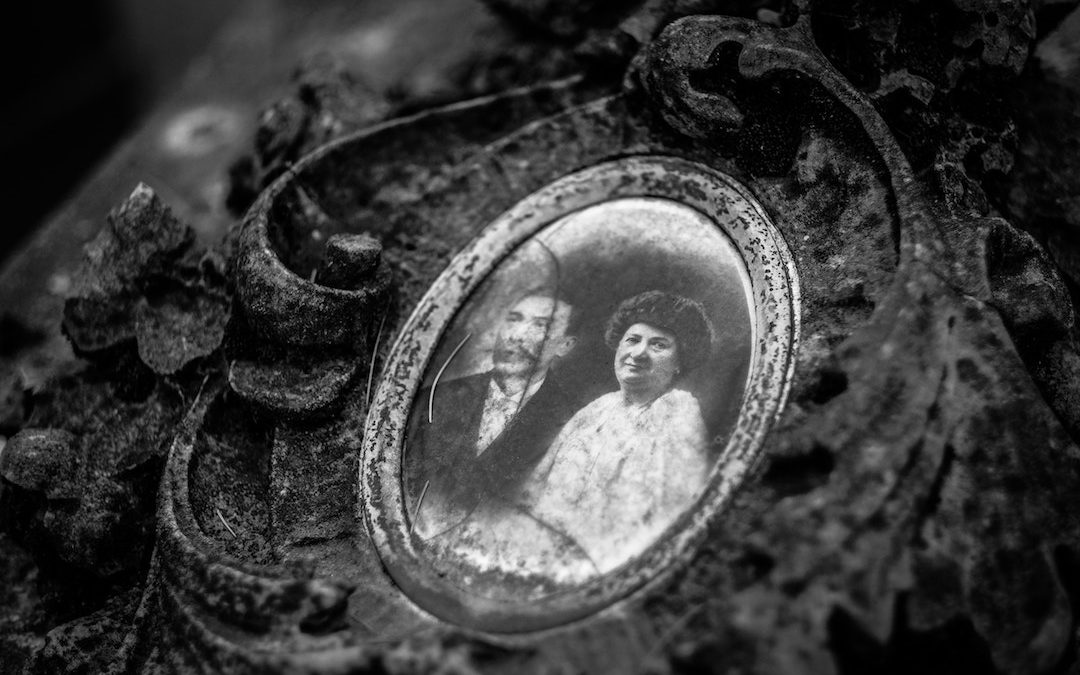
by Rachel Toalson | Wing Chair Musings
This weekend my husband and I sifted through fifteen years of papers and pictures we had stashed in boxes in our garage. We found college essays, old emails we’d sent to each other, and baby pictures of us that our parents had handed over years ago.
In among the pictures, I found one that captured five generations of the women in my family.
I remembered this picture. It used to make me laugh when I was a girl, because the older the generation, the shorter the woman. I was around eleven or twelve in the picture; I was the tallest female standing.
What I noticed this time, however, was not only the stair step quality about that picture; I noticed the women—their strength, their poise, their certainty that life was theirs for the taking.
There was white-haired Memama, who lost her husband young, who lived, alone, in the house he built her until the day she fell on its sidewalk and died during hip surgery, who slept with a pistol under her pillow, just in case. She was legendary in our family. She lived until she was one hundred years and two weeks old.
There was her daughter, my Nana, who had false teeth and a pacemaker, who wouldn’t go anywhere without her orange-tinted lipstick, who made the best chicken and dumplings in the south. She lost a son early, in a car accident, practically raised his kids, lost her husband in his garden, and drove way too fast, as though daring life to take her, too. She would have loved to know the Astros won the World Series this year. She lived until she was ninety.
There was her daughter, my Memaw, who had a fiery temper (especially on roadways), loved the color purple, and stayed up late snacking on Riesen caramels, potato chips, and Werther’s original hard candies. She was opinionated (just ask my Uncle John), bitter at the edges, and one of the most generous people I’ve ever known. She lived without her husband for more than thirty years, in a house all by herself, until she died at seventy-four.
And there is my mom, who spent years raising her three kids as a single mom before my stepdad came along. She made hard choices, worked more than one job, and sacrificed her dream of becoming an anthropologist to become a school librarian (which I think she liked better anyway). Today she runs the Jackson County library I grew up visiting and stocks every book I write.
Sometimes I forget this long line of strong women who stand behind me. I forget that they are in my bones, in my veins, in my mind and heart. I forget that their strength is also my strength, that the greatness that lived in them is also the greatness living in me.
Looking at this picture makes me wish that the three women in it who are no longer living were here—to walk, unafraid, out the doors of her old house on the wrong side of the tracks; to yell raucously for the Astros and remind us that she’d been rooting for the right team all along; to laugh until the sound shakes itself out. To meet my sons, to show them what strong women look like, to share a past that is wholly unimaginable to children today.
But the ones who remain—my mother, my aunt, my sister, and me—will tell their stories, live in their strength, and carry on.
We will remember.
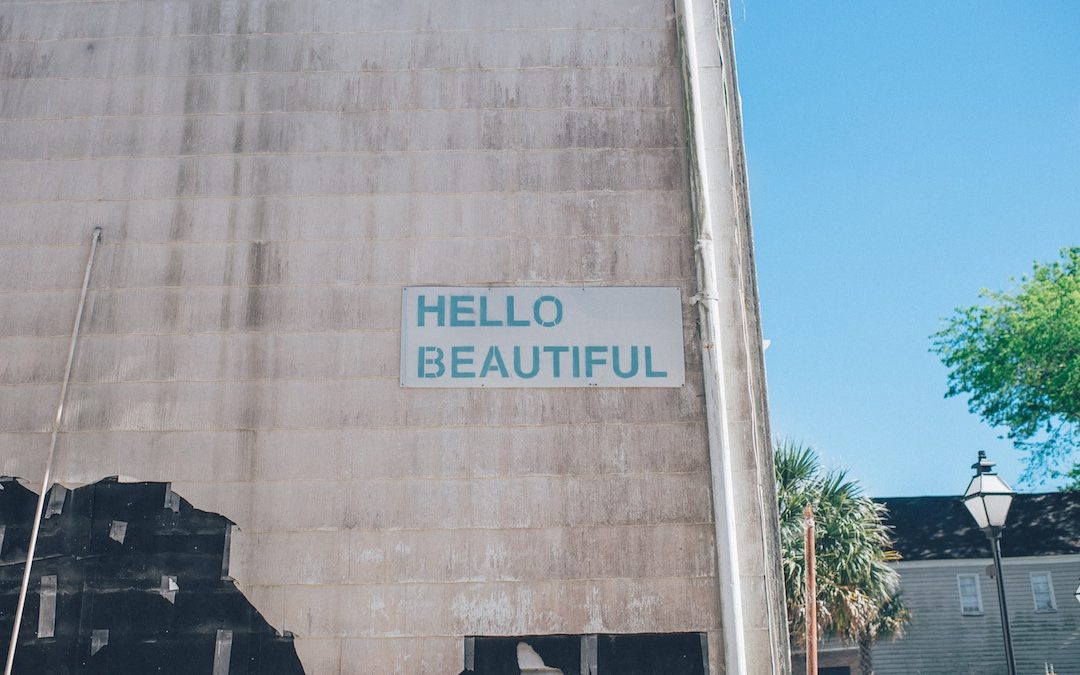
by Rachel Toalson | Wing Chair Musings
Some days I know the truth, and some days it gets buried so far beneath those old lies I can hardly remember its echo.
This morning I woke up feeling out of sorts. Not unexpected, since there is a baby who had trouble sleeping. Since there was a brain that just wouldn’t turn off. Since there is work that has, lately, followed me right into sleep.
But this was something different. Something deeper.
This was me. This was my body. This was lie, a pair of them, rising up from the graveyard, where I thought I’d buried them long, long ago.
You see, I wrote an article about a woman’s body after pregnancy that got a whole lot of attention, and here came all those haters, hating. Their voices stirred those ghosts from their graves. While I was sleeping, the corpses came walking, and when I looked in the mirror this morning, they opened their mouths to speak.
Six weeks you’ve had, they said. Six weeks you’ve had to lose that belly. AND IT IS STILL HERE.
And then they smiled with their rotten teeth and told me the worst part of it all: Unbeautiful. This is unbeautiful. You are unbeautiful.
I could not argue. Not right now. Not today. Because today, this moment, their words feel true.
///
The first time I heard their voices, I was too young to know them for what they were. I listened to commercials and all those teen magazines and the Hollywood ideal of thin and pretty, and I stopped eating lunch when I was twelve. I stopped eating breakfast when I was a freshman in high school. I stopped eating the last meal of the day my first day of college, because, for the first time in my life, there was no one to monitor what I ate or didn’t eat.
I thought I could get away with it and that I would finally reach my target weight, which was bony and completely and utterly fatless. But I had a roommate who cared. She noticed my rapidly dropping weight and dragged me to dinner at a dining hall every chance she got. So it wasn’t long before I started purging those suppers.
I would walk with her to the dining hall and eat whatever I wanted, and then, when she was preoccupied with our friends across the hall, I would slip off to the bathroom and do what needed to be done. When she noticed, I made my excuses. Something I ate made me sick. Stress. A virus, maybe. She didn’t buy it, so the next stop was laxatives, because that was easier to hide. It was my course load, the pressure to make good grades, the stressful news job that kept me in the bathroom all the time. Laxatives got me through the rest of that semester.
Bulimia never really had my heart, though. I much preferred anorexia. So as soon as I moved off campus, I returned to the familiar hunger pains. I kept cans of green beans in the pantry, and the days I felt especially hungry, I’d allow myself one can a day. My roommates were too busy to notice.
Then I met my husband, and there came a night when he left a note on my computer at the newspaper office.
Skinny does not equal beautiful, it said. And for some reason, I almost believed him.
I looked at that note every time I sat down in my office chair and every time I got up to leave. It rescued me before my heart could stop from the sickness, but there are other ways to die than the physical ones, and I was already well on my way, gripped by the compulsive claws of anorexia.
///
Today is a reckoning day, six weeks postpartum, a day when I will visit my doctor again and stand on that scale. A scale that will tell me how much I have left to lose. A scale that will tell me, just a little bit, who I am now.
I hate that this is so. All this time I’ve stayed away from the scale, because I said it didn’t matter, and I meant it this time. I really did. This son is my last baby, and I just wanted to enjoy him without worrying about what I look like. And that’s exactly what I did. Until now.
I dressed for the morning. Those after-pregnancy transition jeans fit. A transition shirt hid the pooch. I got my hopes up, I guess.
And then I walk in the doctor’s office and I step on the scale and I see how much weight is left, and I crumble. I thought it would be different, not as quite much, not quite as ugly. Those voices start their howling.
Guess you should have tried harder, they say.
Guess you should have exercised more, they say.
Guess you should have worried about it a little more, instead of indulging in your son, they say.
I try to swallow the disappointment, and then the nurse takes me to a room with a mirror, and I have to look at my body before I wrap a flimsy sheet of paper around it, and I can’t help it. I turn away, because I don’t want to look. I know what’s there. Sagging skin that may or may not shrink back this time, because this is the sixth time. Lines that mark my midsection and a belly button that’s hardly even a belly button anymore it’s been stretched and pulled and rearranged so often.
Those voices grab all of it and fling it right back in my face. Right back in my heart.
This is what unbeautiful feels like.
///
Just after the first was born, I did not know how a woman’s body worked. So when he slid out and my belly turned to mush, I cried. It wasn’t supposed to be like this. I wasn’t supposed to look like this.
Our first day home from the hospital, when my body had only spent thirty-six hours recovering from a thirteen-hour labor, I went for a walk, because exercise has always been my crutch. Three weeks after he was born, I was out running, with a uterus that hadn’t even fully shrunk and hips that were only just sliding back into place and joints that couldn’t really take the jarring pressure of five miles. I didn’t care. I pushed it anyway.
When I injured myself, because my body wasn’t ready for what I was demanding of it, I quit eating. I pretended I wasn’t hungry. I let my husband consume those meals people so kindly dropped by.
And then one day he shook me by the shoulders. You have to eat, he said. This isn’t the way to do it.
I knew he was right. But it was so hard. So hard. Because every time I looked in the mirror, what I saw was unbeautiful.
Anorexia makes it hard to see anything else.
///
So this is what unbeautiful feels like.
It feels sad and sharp and hard and achy and impossible and shocking. Most of all it is shocking.
We can go whole years knowing and believing and living the truth, and then one thing, one tiny little thing, can raise the dead and make them walk again. It happens for many reasons, this feeling unbeautiful. It happens because someone drops an insensitive comment about our bodies that hits us right where it hurts. It happens because we live in a society that tells us skinny equals beautiful and don’t you dare argue. It happens because we look in the mirror and the body looking back is not the one we think we need or want.
Unbeautiful, the kind that makes us starve or cut and bleed or stick a finger down our throat—it is a sickness. An addiction. A compulsion. There is no real cure, at least not one that will last forever. There is only one day at a time.
Every day we are offered the choice to look in the mirror and shake our fists at those living-again lies and say: No. I don’t believe you. This body is not unbeautiful. It is strong. It is amazing. It is the loveliest beautiful there ever, ever was. Because this is the truth.
Or we can believe the lies. Believing the lies locks us into our harmful patterns of skip the food, binge and purge, count calories to the utmost accuracy.
I want to embrace the truth.
So after my doctor finishes her examination and releases me and walks from the room, I return to the mirror, and I dress again and then snap a picture, because I want to remember. I want to remember the day I looked at my body and finally, finally, finally said out loud, if only to myself, what was true: This body. I am so very proud of what it has done. It has housed and carried and nourished six boys and a girl we will meet in glory. So what if there is still an after-belly six weeks later? THIS BODY HAS DONE SOMETHING AMAZING AND BEAUTIFUL. It needs to revel in that. So I will let it take its time.
And I mean it.
Those corpses, the anorexia and bulimia that have breathed down my neck all morning, start crawling back to their graves, because you know what? They know, too.
This is what beautiful feels like.
This is an excerpt from We Count it All Joy, a book of essays. For more of Rachel’s writings, visit her Reader Library page, where you can get a couple of books for free.
(Photo by Ian Schneider on Unsplash)

by Rachel Toalson | Wing Chair Musings
Around Christmas time one year, when my oldest son was four or so, someone asked him if he’d been good this year. It was an innocent question, a question people often ask children because it is, in the folklore of contemporary life, tied to the gifts that might be waiting underneath the tree come Christmas morning.
My son was never one for masks and pretending. He said, “I’ve been a little good and a little bad.”
And it was true; he had.
This contradiction lives in all of us. We all have the capacity within us to be a hero one day and a villain the next. We all have a measure of good that is countered by a measure of evil (though we are not, ourselves good or evil; we are simply human). We all struggle wrestle with both light and darkness.
I want, more than anything, to be kind in all ways. I desire to make every interaction count. I hope, always, to be an ever-present, encouraging voice.
And yet there are times I feel myself overcome with emotion—so overcome that my greatest desire is to lash out and hurt, to say words that I know I’ll regret later, to feel the power, however convoluted or corrupt it is, of being on top for just a moment in time.
There is a mean bone in all of us that wants to feel like we matter in the grand scheme of things, that we belong somewhere, that we are people who have a small pinch of power.
These contradictions that exist within all of us are relatively harmless—when our thoughts remain thoughts and we remain vigilant. When we recognize, accept, and restrain them.
In these contradictions, we can feel the connection of humanity—the dark impulses rising up in us that we can imagine rise up in everyone else, too. If we sit with that darkness for a while, we can understand the impulses that govern the cruel, we can measure the capacity for harm, we can almost, maybe just a little bit, fathom why this cruelty sometimes spills out into the fraught spaces of the world.
But if we deny these dark places within ourselves, if we say of course we have never had a terrible thought about another person, if we do not at least momentarily acknowledge and connect with that side of ourselves, we will never completely understand the failures of some to control it.
And, what is more, when our darkness is ignored and denied as though it never existed at all, it becomes stronger and more difficult to control.
If ignored and denied long enough, we could fall into the gap between our real selves and our imagined (better) selves. And once in the gap, the darkness does not have to work hard to best our control, to control us instead of the other way around.
Better to deny or acknowledge?
I know which I’d choose.
(Photo by Cherry Laithang on Unsplash)
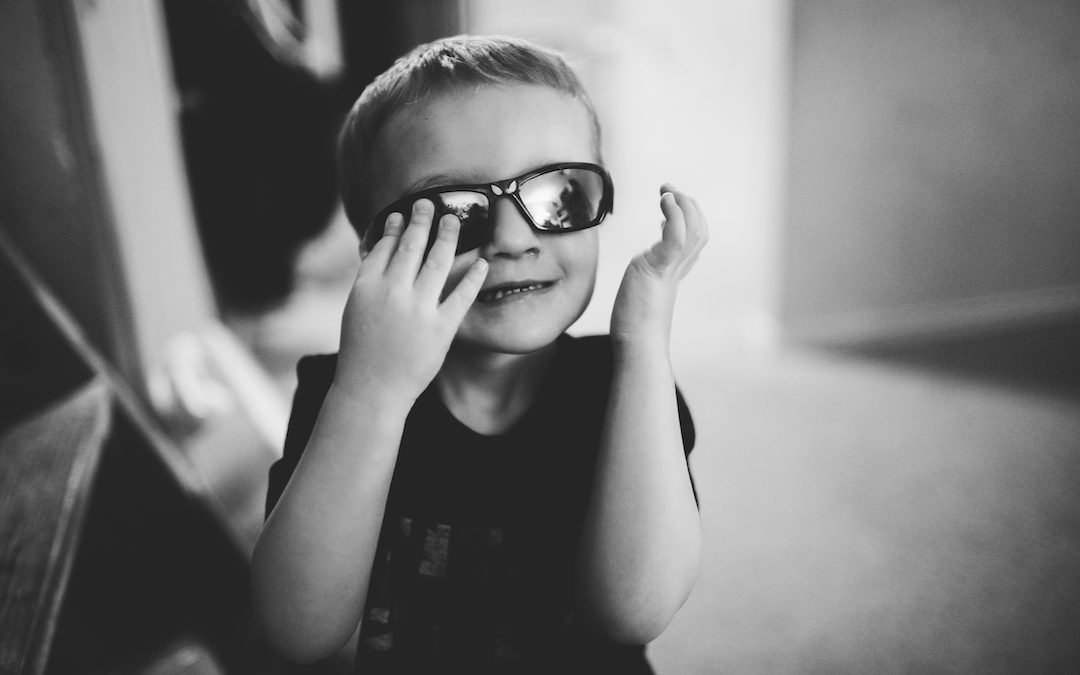
by Rachel Toalson | Wing Chair Musings
I was alone in my bedroom. It was Friday night, the time when my husband and I schedule our weekly at-home date night. He’ll pick up takeout and we’ll spread out a blanket on our bed and watch some Netflix while we eat. He was already on his way to pick up a chicken sandwich we’d share, along with some chips and queso. My boys were in the next room, reading. I usually take the time alone to write a little.
This particular night I was in the middle of what I think was a profound thought—and the door flew open. My three-year-old was there, smiling at me, effectively ejecting me from my profound thought and planting me right back in the real world.
“I want to have you,” he said.
I felt a little annoyed, but I smiled and patted the spot next to me on the bed. He climbed up and showed me the Stitch stuffed animal (from Lilo and Stitch) he had brought with him. Stitch is attached to a slap bracelet that I’m surprised still works in this house of destructive boys.
My son bounded off the bed after a few minutes, climbed into the wing chair where I normally write, and used Stitch to turn off the light.
“Did you see that, Mama?” he said. “Stitch turned the light off with his tail!” His blue eyes sparkled with a delighted gleam, and I could see his tongue smashed between his teeth.
My writing was forgotten. I had to bask in his joy, his smile, his pleasure at having turned off the light with Stitch’s tail.
He climbed back down from the chair, launched at me for a kiss, and scrambled toward the door.
“I love you,” I said.
“I love you, too, Mama,” he said as he bounded out of the room, Stitch flying in parabolas beside him.
Magic is everywhere.
I’m glad I had my eyes open to see it.
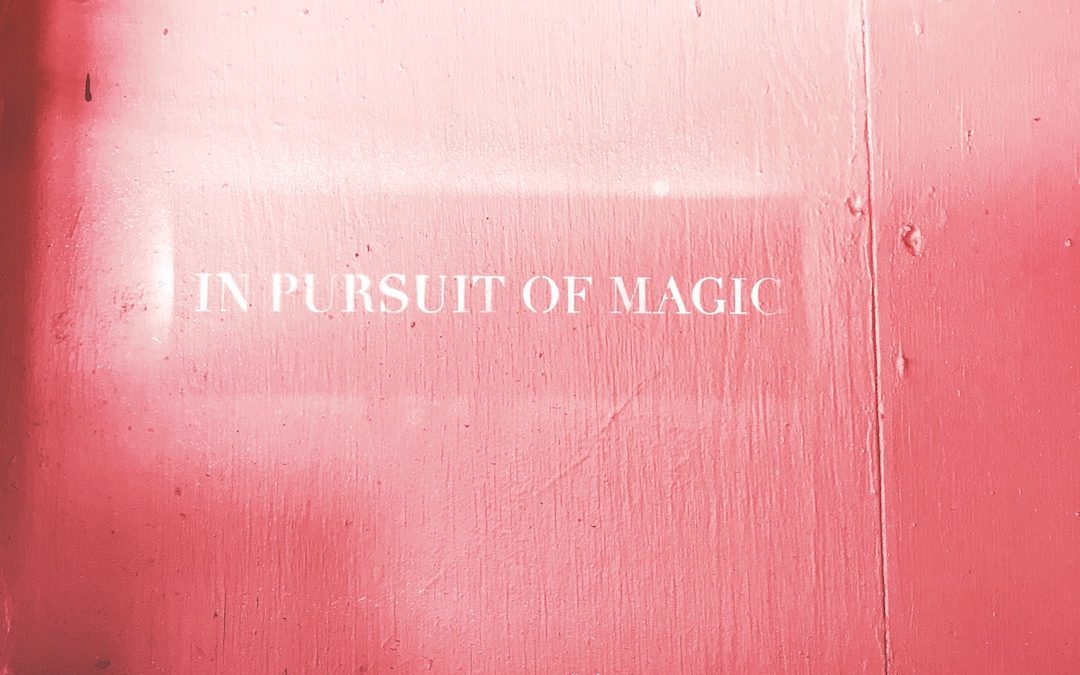
by Rachel Toalson | Wing Chair Musings
The world is breathtaking.
The other day, my family and I were driving to church, and the clouds looked as though they were a rolling white and gray ocean, a collection of froth and waves, a layered landscape that begged my attention. My husband was driving, so I snapped pictures, which, of course, did not do the beauty justice. I am no Oliver Pike or Andreas Feininger, though I am a great admirer of nature photography.
I pointed out the spectacle to my children, who paused their backseat fighting to express their awe (they are as enamored with the natural world as their mother).
“It looks like an ocean,” one of them said.
“It looks like we’re driving under the ocean,” another of them said.
“It looks like…” Another could think of nothing to add.
“Like we’re driving upside down, under a sea of gray waves,” I said.
They all laughed at the image—driving upside down!—and agreed.
The clouds, that day, looked like magic. (The interior of our car also felt like magic; my sons did not resume their argument after my interruption. Maybe the clouds really were magical.)
I believe that everyday magic (one might call it miracles) exists everywhere—we just have to know how to look for it. We simply have to open our eyes, fasten them on a point, let the wonder steal into our bones and take us where we have not been before.
I see magic when one of my boys brings me a flower
I smell magic when my oven is baking homemade brownies
I feel magic when my husband gives me a head massage after a headache-y kind of day
I taste magic when chocolate melts in my mouth
I hear magic when a symphony plays
The world doesn’t always seem like the most interesting thing; we can spend days and weeks and months feeling like we always see or hear or taste or feel or smell the same old things. We have to intentionally take notice of its radiance to notice this everyday magic, which does not announce itself but often flutters in on a whisper.
We see everyday magic when people are kind to each other, when a story is read to a child, when love wins (love is always a magical thing).
All it takes to witness everyday magic is to see it—to say, “Ah, look. There it is.”
There it is. Do you see it?
(Photo by Karly Santiago on Unsplash)







